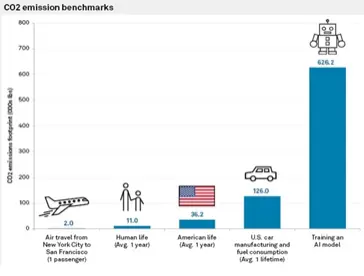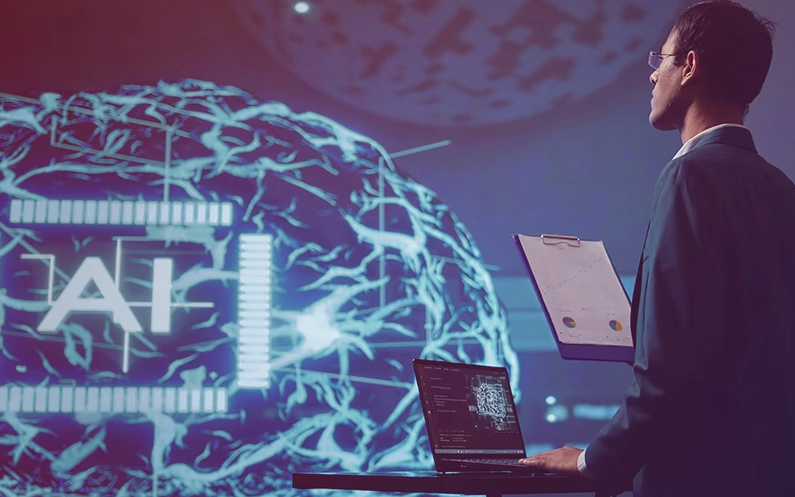AI also plays a role in social media feeds. You might have noticed your feeds changing from what you used to see. Deciding which posts, ads, and news articles appear based on your interests and behavior. E-commerce websites like Amazon use AI to recommend products, while email services like Gmail use AI-powered spam filters to keep unwanted messages out of your inbox. Even when navigating traffic with Google Maps or Waze, AI is working in real-time to analyze road conditions and suggest the fastest routes.
But AI is playing a larger role in offices across the globe. Some that you might have used include:
- ChatGPT
- Perplexity.AI
- Gemini
- CoPilot
- DeepSeek
- Meta’s Llama
How Does AI Work?
AI works by first taking in all the data it has given directly or given access to. This data can come from many diverse sources, such as datasets that are built by organizations or by scraping the internet. Once all this data is collected, it is sorted into various categories. Then, it analyzes the data using patterns it has been taught, trying to recognize similarities. Based on these patterns, it makes predictions about what might happen next. If the AI gets something wrong, it learns from the mistake and keeps repeating the process under different conditions until it figures out an appropriate response.
While AI brings incredible benefits, it also presents challenges. Understanding both the benefits and risks of AI is crucial for making informed decisions about how we use it in our daily lives. By weighing the pros and cons, we can maximize AI’s potential while staying aware of its limitations and ensuring responsible usage.
The Pros of AI
- Eliminates Human Errors
Humans make mistakes. With AI, decisions are made at every step based on information previously gathered. When programmed correctly, the algorithms can reduce the number of errors.
- Increased Efficiency
Through AI, repetitive tasks such as checking documents for flaws, mailing thank you notes, responding to customer through chatbots, and data entry are practically eliminated. This creates efficiency and increases automation.
- Available 24/7
Because it does not have set work hours nor experiences fatigue, AI chatbots are always available whenever needed.
- Data Cleansing and Analysis
Compared to humans, AI can analyze massive quantities of data at a faster speed. It can sift through immense amounts of information at lightning speed, helping businesses make sense of large datasets and extract pertinent information without human intervention.
- Cost Reduction
Companies can save the payroll costs needed for employees since manual and tedious tasks are reduced. AI can do repetitive tasks quickly with fewer errors.
- Enhances Decision Making
AI can identify trends and patterns not easily noticed by humans. Through this process, it can come to unbiased conclusions and make predictions.

Penta Security. https://www.pentasecurity.com/blog/fraud-detection-system-fds-with-ai-technology/
- Fraud Detection
AI tools can flag unusual and suspicious behaviors and transactions in real time. This is done by analyzing transaction patterns and identifying anomalies that may indicate fraudulent activities. - Enhances Customer Service
Algorithms are used to analyze a customer’s preference and behavior to personalize their recommendations. AI tools predict what the customer may be interested in based on past purchases and browsing history.
The Cons of AI
- Hallucinations
AI Hallucination is when an AI tool thinks that something is true and the information looks like it is true, but it is not accurate. For example, an AI may say that 2+2=5. 5 is a number that looks accurate but is not the correct answer. One way to avoid this is to ask the AI for the steps to take to get to its answer. When ChatGPT first came out, a lawyer used ChatGPT to help him make a list of previous cases that supported his argument. One of the cases that he cited in court was not a real case. ChatGPT had made it up entirely. The false case sounded like a real case and had all the documentation of a real case, but it was not real.
- Lack of Human Creativity
AI can only generate content as diverse and creative as the data it was trained on. AI is unable to produce genuinely innovative, new, and unique ideas.
- Decline in People Gaining Information-Seeking Skills
People no longer have to search through article links, YouTube videos, and even books to find the exact information they need. They can ask an AI tool, and it will respond to them like a person would, but the person is not using any critical thinking skills to determine if the response is correct and applicable to the request.
- Decline in Student Learning
Many student assignments are being completed by AI, which makes students learn less and procrastinate more. This over-reliance on AI not only weakens problem solving skills but also reduces creativity and independent thinking. When students use AI to generate answers instead of working through challenges themselves, they miss out on the deeper understanding that comes from trial and error.
- Job Displacement
AI is taking over a lot of repetitive jobs, which means some people are losing work, especially in industries like manufacturing and customer service. While new jobs are being created, not everyone has the skills to switch easily, making it harder for some workers to keep up.
- Environmental Issues
Training large AI models consumes massive amounts of energy, with data centers relying on fossil fuels, leading to high carbon emissions and environmental strain. Additionally, AI’s demand for specialized hardware contributes to electronic waste, resource depletion, and excessive water usage for cooling, further harming ecosystems.
Earth.org: https://earth.org/the-green-dilemma-can-ai-fulfil-its-potential-without-harming-the-environment/
- Security Risks
While businesses are trying to determine the best uses for AI, cyber criminals are already using AI for their own purposes. AI poses security risks like cyberattacks, data breaches, and automated hacking, making systems more vulnerable. It can also be used to generate deepfakes, spread misinformation, or bypass security measures, creating new challenges for cybersecurity and privacy protection.
- Ethical Concerns
AI raises ethical concerns in several areas. If the algorithms are not carefully created, there can be a bias in decision-making. There are also issues with privacy and the rapid spreading misinformation. It can reinforce existing inequalities, collect, and use personal data without consent, and be used for deepfakes or surveillance, making it essential to set regulations for ethical and legal AI use.
How to Stay Safe with AI
While there are many positive uses for AI, there are also negative ones that may harm others. This can include using AI to quickly generate tailored phishing emails, voice fakes, and deepfakes, and using data that it should not. To protect yourself and your business, make sure to remain vigilant and be smart.
- Ensure you are using the most up-to-date version of any AI tool: Sometimes, the developers will include security patches in new releases and updates.
- Be mindful of what information you are giving the AI: Avoid giving the AI tools confidential information such as bank statements, social security numbers, phone numbers, vacation details, etc. AI may store this information, allowing hackers access.
- Use a strong password/multi-factor authentication (MFA): This will secure your accounts so the information that you feed the AI is not easily accessible to anyone else.
- Review the privacy terms of the AI tool: Ensure that the AI is not using your personal information in a way that you do not want it to.
- Set up a Safe Word: This protects against AI scams that use voice cloning and deep fakes to impersonate loved ones or coworkers, enabling secure verification through unique, private words.
- Stick to trusted AIs: Well-known companies tend to have better ethical guidelines and stronger security measures.
AI is a powerful tool that continues to shape our world, offering exciting opportunities alongside significant challenges. As technology evolves, staying informed about AI’s capabilities, risks, and ethical considerations will help use it safely and effectively. Whether you are leveraging AI for work, education, or personal tasks, responsible usage and awareness of its impact will be key to navigating the future of artificial intelligence.
Sources:
https://www.cisa.gov/sites/default/files/2024-09/Secure-Our-World-Using-AI-Tip-Sheet.pdf
https://www.geeksforgeeks.org/What-is-ai-artificial-intelligence/


 contact@shetek.net
contact@shetek.net 





Blog comment section